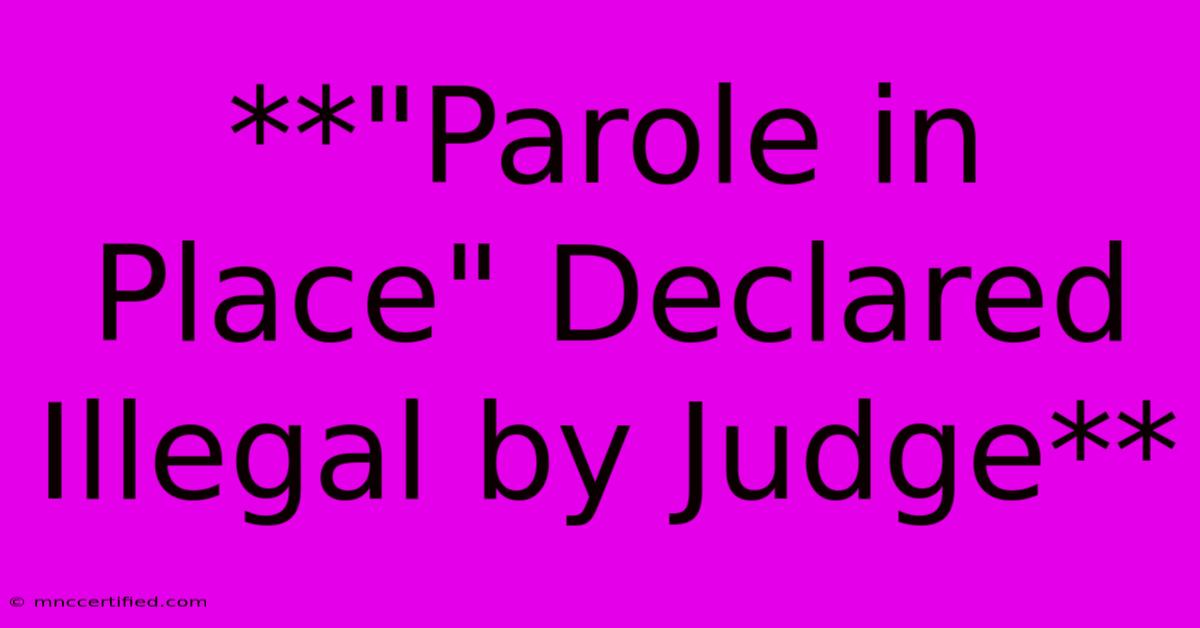**"Parole In Place" Declared Illegal By Judge**

Table of Contents
"Parole in Place" Declared Illegal by Judge: What You Need to Know
In a landmark ruling, a judge has declared the practice of "parole in place" illegal, sending shockwaves through the criminal justice system and sparking heated debate. But what exactly is "parole in place" and why was it deemed unlawful? This article delves into the details of this groundbreaking decision and its potential implications.
Understanding "Parole in Place"
"Parole in place," also known as "home confinement" or "house arrest," is a sentencing alternative where an individual convicted of a crime is allowed to serve their sentence at home under strict supervision. Instead of being incarcerated in a prison, they are monitored electronically, with restrictions on their movement and activities.
This practice was often employed in cases where incarceration was deemed unnecessary or impractical, due to factors such as the nature of the crime, the offender's age, or pre-existing health conditions. It was seen as a way to reduce prison overcrowding, lower costs associated with incarceration, and allow for greater rehabilitative opportunities within the community.
The Case Against "Parole in Place"
The judge's decision to declare "parole in place" illegal stems from concerns over its constitutionality and its potential to undermine the justice system. The core arguments against the practice include:
- Violation of Due Process: Critics argue that "parole in place" deprives individuals of their right to due process by imposing restrictions on their liberty without a fair trial.
- Inadequate Supervision: The effectiveness of electronic monitoring in preventing further criminal activity has been questioned, with concerns about potential loopholes and the lack of consistent oversight.
- Unfair Treatment: There are concerns about the potential for bias in the application of "parole in place," with certain demographic groups disproportionately affected.
- Safety Risks: Some argue that allowing convicted criminals to remain in the community under "parole in place" poses a significant safety risk to the public.
Implications of the Ruling
The declaration of "parole in place" as illegal has far-reaching implications for the criminal justice system:
- Increased Prison Population: The decision could lead to a surge in prison populations as more individuals are incarcerated instead of being placed under home confinement.
- Higher Costs: The increased prison population will likely result in higher costs for the state, straining resources and potentially leading to budget cuts in other areas.
- Limited Rehabilitation Opportunities: Individuals who would have been eligible for "parole in place" may now have fewer opportunities for rehabilitation and reintegration into society.
- Shifting Sentencing Practices: Judges will likely need to adapt their sentencing practices to account for the unavailability of "parole in place," potentially resulting in longer prison sentences for certain offenses.
What Lies Ahead
The implications of this landmark ruling are still being assessed. As the legal landscape continues to evolve, it's crucial to monitor the ongoing debates and observe how the decision impacts sentencing practices and the overall functioning of the criminal justice system.
Further Discussion:
- What are your thoughts on the judge's decision to declare "parole in place" illegal?
- Do you believe this ruling will have a positive or negative impact on the criminal justice system?
- What alternatives to "parole in place" should be considered for non-violent offenders?
This decision is a significant moment in the ongoing discussion about criminal justice reform. It raises important questions about the balance between public safety and individual rights, and its impact will be felt for years to come.

Thank you for visiting our website wich cover about **"Parole In Place" Declared Illegal By Judge**. We hope the information provided has been useful to you. Feel free to contact us if you have any questions or need further assistance. See you next time and dont miss to bookmark.
Featured Posts
-
Scherzinger Criticized For Alleged Trump Allegiance
Nov 09, 2024
-
Dry Stacked Masonry Is Bonded Together
Nov 09, 2024
-
Irelands Scrum Can They Improve In 2023
Nov 09, 2024
-
Watch La Liga Live Us Streaming Guide Friday Nov 8
Nov 09, 2024
-
Annie Metzler Insurance Quarryville Pa
Nov 09, 2024